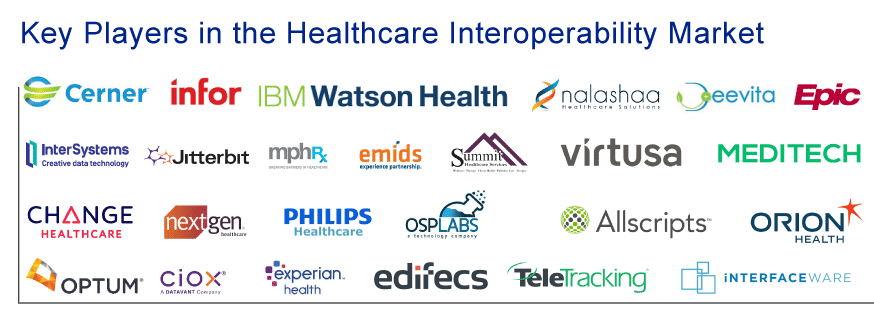Interoperability Solutions in Healthcare – Evolving Market Dynamics and Improving Health Outcomes
Aug 17, 2022
Table of Contents
In today’s highly dynamic and evolving market dynamics, interoperability plays a key role in facilitating organized and effective data exchange between information systems. Businesses across different verticals and sectors are implementing interoperability in the system to address critical issues such as duplicate information across different areas, lack of cohesion between different parts, and the existence of several information systems that work separately.
With the growth in technology, the increase in demand for information, and complex systems being networked together, interoperability issues are getting bigger and broader for the IT professionals handling the data in the organisation. To ease the communication across the verticals, companies across the globe are actively working in the Healthcare Interoperability segment. Being able to exchange information between applications, databases, and other computer systems is crucial for the smooth functioning of the healthcare system.
Downloads
Article in PDF
Recent Articles
- Cerenovus Launched Next-Gen Stroke Revascularization Catheter; Dexcom Launched New ONE+ CGM Syste...
- Emerging Market for Organ on a Chip
- Neuromodulation Devices Observed to Reshape the Migraine Treatment Dynamics
- Laborie Medical Acquired Urotronic; Sirtex’s LAVA Liquid Embolic System; Paige’s Cancer Detection...
- Siemens Healthineers’s COVID-19 Antigen Self-Test; Paragon’s R3ACT Stabilization System; Pulnovo ...
What is Interoperability and How Does it Work in the Healthcare Setting?
Interoperability in healthcare refers to the capability of computerized tools such as apps, equipment, products, and other devices in the systems developed by widely different manufacturers in the industry to seamlessly exchange, access, and comprehend the data without end-user’s involvement. Interoperability ensures timely and secure access, integration and use of electronic health data. The overall aim of the interoperability implementation is to optimize health outcomes. To enable Interoperability, the system requires the syntactic approach, allowing systems to adopt standard data formats and structure protocols. Interoperability is quite common in some sectors, like in the case of banking. For example, we can use an ATM Card of a particular bank for transactions from different banks and even in different countries.
Similarly, in the case of healthcare, the data can be shared across different devices, departments, and organisations. In the healthcare industry, interoperability can streamline managing, receiving, and sending updated medical records via electronic systems. It can cover the whole process from patient admission to lab testing and the generation of medical reports to medical billing. It enables the healthcare professionals to quickly access the patient’s medical information even if they are not in the organization’s internal systems and makes real-time decision-making easier.
Interoperability is a complex procedure and is not just limited to exchanging information. A full interoperability system ensures both the exchange and then use of the data.
Types of Interoperability in Healthcare:
- Syntactic Interoperability – In Syntactic interoperability, two or more services and systems can communicate and exchange data in a meaningful way, thus allowing different types of software to understand each system and work together in synchronisation. The process can continue even if both systems operate on different interfaces/languages.
- Structural Interoperability – In Structural interoperability, data exchange formats are defined for uniform movement of healthcare data from one system to another system. It specifies the standards for converting complex data sent from one system to another. This is essential for users to be able to understand the information’s purpose clearly.
- Semantic Interoperability – In Semantic interoperability, two or more systems connect and exchange information with shared meaning through the use of a standards data format that each system understands in a meaningful way.
What are the Key Benefits of Interoperability in the Healthcare Industry?
Interoperability can provide immense benefits to the healthcare organization. Some of the key benefits include :
Adaptability: With Interoperability, the business receives information more quickly and automatically as it can efficiently connect and share the information with the relevant parties.
Better Productivity: Interoperability ensure smooth business operations as necessary data can be shared more efficiently and effectively with all parties and systems involved in the process.
Data Unity: With Interoperability, data unity can be performed more easily. It facilitates the businesses to manage and access information from external systems and vice versa.
Lower Costs: Interoperability makes the systems synchronized and can send/receive information in a more systemic and organised way. Interoperability takes up fewer resources, smooth health data exchange, improves care coordination, reduces hospital readmissions, and ultimately saves hospitals money.
Fewer Errors: Interoperability plays an essential role in data sharing across different applications and systems, enhancing patient care quality, reducing errors, and improving decision-making. Connecting information systems eliminates duplicate and outdated data and results in better quality data and, thus, fewer errors.
Improved Data Protection: Interoperability makes data protection easier. It can save sensitive data.
Despite several benefits, the lack of standardization for receiving, sending, and managing the data across multiple sources is one of the key challenges in interoperability. Similarly, overcoming organizational resistance to sharing data, and the high cost associated with personnel management, are other major challenges.
What are the major players in the Healthcare Interoperability Solutions Market?
Globally, several prominent companies are investing heaving in developing innovative healthcare interoperability systems to gain a competitive advantage and market share. Some of the major industry players operating in the Healthcare Interoperability Solutions Market include Cerner Corporation, Infor, IBM Watson Health, Nalashaa Healthcare, DeeVita LLC, Epic Systems Corporation, InterSystems Corporation, Jitterbit Inc., MphRx, Inc, eMids Technologies Inc, Summit Healthcare Services, Virtusa Corp., Medical Information Technology, Change Healthcare, NextGen Healthcare, Koninklijke Philips N.V., OSP Labs, Allscripts Healthcare Solutions Inc., ViSolve Inc., Orion Health Group, Medicity, Optum Insights, Ciox Health, Experian Health, Edifecs, Teletracking Technologies, iNTERFACEWARE, and others.

Owing to positive growth and a favourable market scenario, several key players are expected to enter the Healthcare Interoperability Solutions Market in the coming years. Additionally, the rise in the number of strategic partnerships & collaborations and growth in mergers & acquisitions (M&A) will also influence the Healthcare Interoperability Solutions Market.
Healthcare Interoperability Solutions Market Dynamics
As per DelveInsight, the growth in technological advancements, increased adoption of EHR software in healthcare facilities, and implementation of healthcare IT interoperability standards by the government for the data exchange process will greatly influence the Healthcare Interoperability Solutions Market in the coming years. Moreover, shifting focus on value-based care and rising healthcare expenditures will also drive the growth of the Healthcare Interoperability Solutions Market.
However, the high cost of healthcare data interoperability software, lack of standards, privacy and security issues, extended use of outdated systems, and lack of awareness regarding interoperability software are some of the key factors anticipated to hamper the Healthcare Interoperability Market. Additionally, the shortage of qualified professionals and a rise in cyber-attacks globally will also lead to the slow adoption of interoperability in healthcare.
Healthcare Interoperability Solutions – Future Perspective
Healthcare is a complex segment with thousands of variables, clinical terminologies, technical specifications, and functional capabilities. With each passing day, new variables and terminologies are being added, making the data sharing complex. To deal with these variables or data sets, it becomes necessary to develop standards for all of these elements.
The Interoperability Solutions provide a new dimension to the Healthcare industry and ensure efficient communication between clinicians, patients, and other stakeholders across national boundaries, regions, and organizations. The implementation of interoperability across healthcare organizations is set to increase the quality and efficiency of service delivery while lowering costs and errors. As per estimates, the interoperability Solutions in the healthcare market are expected to grow phenomenally with the rising implementation of EHR across healthcare organizations, favourable regulations and initiatives by the government, and the growing demand for better healthcare services by the general public. In the long run, the adoption of advanced interoperability solutions and a higher acceptance rate of new technologies in developing countries is anticipated to increase the efficiency and productivity of the healthcare sector.
Downloads
Article in PDF
Recent Articles
- Can We Overlook The Potential Dangers That Come With AI In Healthcare?
- Medtronic Launches Infusion Set for Insulin Pumps; Penumbra’s Virtual Reality-Based Rehabil...
- Biochips: An Evolving Technology Driving the Future of Healthcare Market
- Eclipse, Medtronic, Aethlon, Cognoa, ObvioHealth, and others Continue to Veer MedTech Market Forward
- Navigating the Most Use Cases of Robotic Process Automation (RPA) in Healthcare



